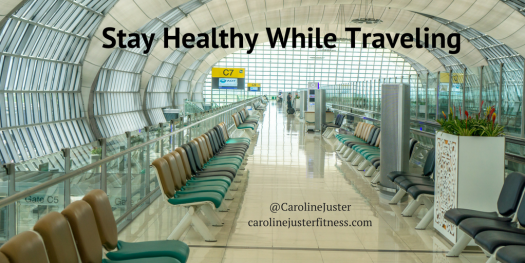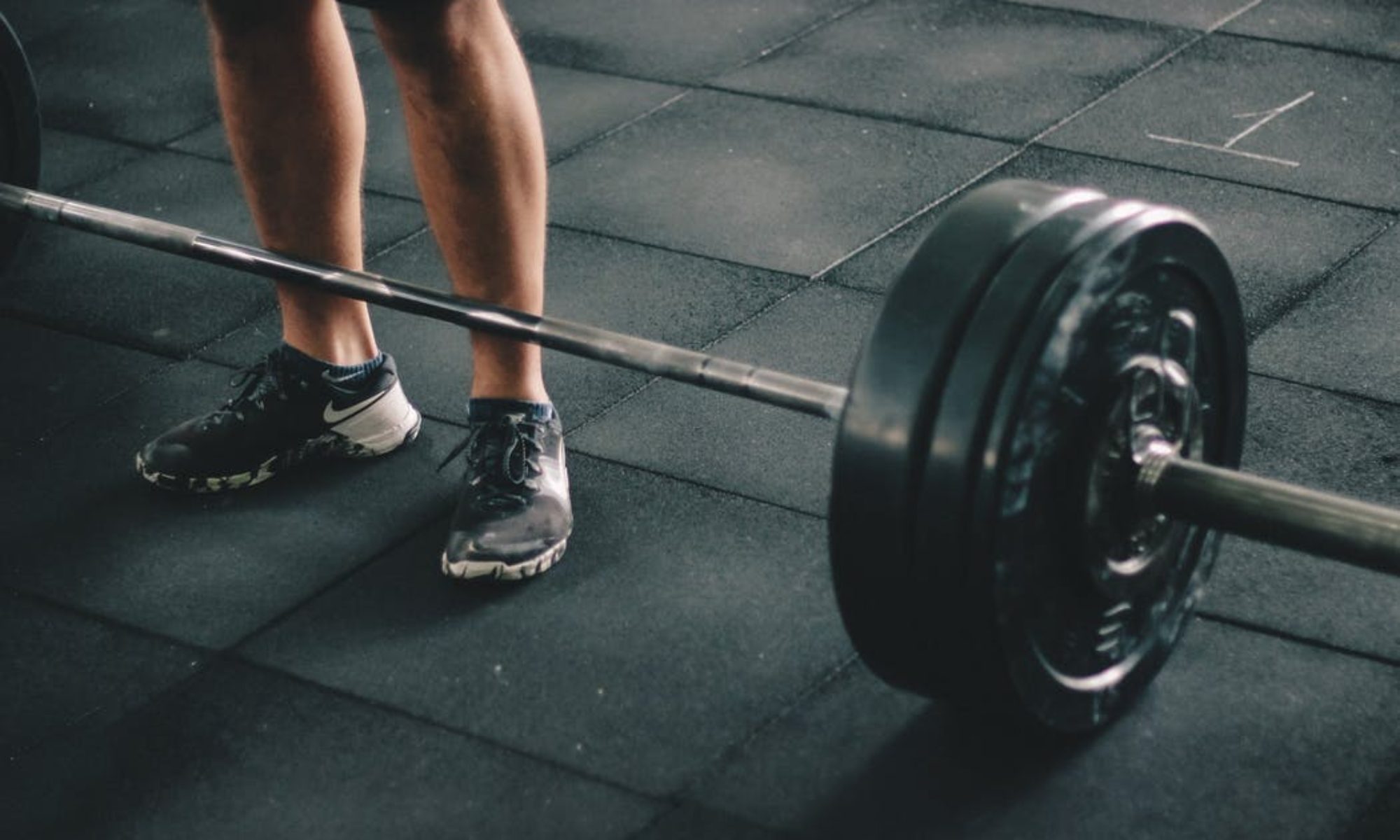
Over the years, I’ve worked with dozens of clients who regularly travel for work. Some take short trips once every few months; others find themselves pulled away for weeks at a time. In any situation, regular travel can be disruptive to a healthy lifestyle. Planning ahead can make all the difference to help you exercise and eat well on the road. Here are some strategies my clients have used to successfully stay on track even with demanding and unpredictable travel schedules.
Before you leave
Learn about where you will be staying before you pack for your trip. Ask if the hotel has a gym and if so, what kind of equipment it contains. Some hotel gyms will only have a broken-down treadmill while others contain cardio equipment, dumbbells, and cable machines. Get this information before your trip so you can pack and plan accordingly. Don’t forget to bring workout clothes and shoes.
If you travel regularly, invest in a couple small pieces of exercise equipment to enhance your hotel workouts. A small band or two and a jump rope (if you tolerate jumping) take up little room in a suitcase and can greatly increase the intensity of a hotel workout.
Always bring some healthy snacks to keep you satisfied when you don’t have good food options available. Protein bars, raw vegetables, fruit, 100-calorie packs of nuts, and jerky work well as snacks.
Call the hotel and see if your room has a fridge and a microwave you can use. If you’re taking a longer trip, use google maps to scope out grocery stores and pharmacies near your hotel. Visit these places when you arrive to fill up your mini-fridge with pre-cut vegetables and fruits, deli meats, and hard boiled eggs for quick. healthy meals and snacks.
Make good choices at the airport
Finding healthy food at the airport is not as challenging as you may think. Restaurants and booths in many airport terminals offer numerous pre-packaged and made-to-order salads, fresh fruit, and pre-cut vegetables. In the morning, coffee shops such as Starbucks usually offer oatmeal and breakfast sandwich options. Even fast food places such as McDonalds offer lower-calorie options such as grilled chicken sandwiches and salads.
Ask for water, coffee, tea, or diet soda when the complimentary beverage cart rolls down the aisle of the plane. Keep some healthy snacks in your carry-on luggage in case you get hungry during the flight.
How to work out at a hotel
Exercising on the road keeps you on track with your health and fitness goals and helps you let off steam during stressful work trips. Win win! If your hotel has a gym with weights, you may be able to complete a variation of your normal workout. I like to use intensity techniques like drop sets, 1.5 reps, and giant sets to make the most of limited weights and equipment.
If your hotel doesn’t have a gym or only has minimal equipment, you can still complete a workout in your hotel room. Try to do this first thing in the morning when you are unlikely to have conflicting work or social obligations.
Fast-paced circuits make the best hotel room workouts. To create your own circuits, first make a list of all the bodyweight (or band if you have one) exercises you know and group them into lower body, upper body, and core categories. Keep this exercise list on your phone so you will always have it with you.
For each circuit, pick 1-3 exercises from each category and complete 2 – 6 sets of each exercise. Most of these exercises will work best in the 10 – 20 rep range. Try to move through the circuit with as little rest as possible. Get creative with your circuits and make them as short or long as needed according to your schedule.
Example circuit, complete 2-6 rounds:
Bodyweight squat x 15
Push-up x 15
Alternating reverse lunges x 15 each side
Band pull apart x 20
Dead bug x 15 each side
Jump rope x 100 turns
Read More: 3 Strategies for Exercising on the Road
Healthy eating on the road
Eating out is one of the biggest challenges of travel. It’s one thing to go on vacation and enjoy the local food with friends and family. It’s another thing to try to make the best possible decisions during regular work trips. If every trip becomes a special occasion, it’s tough to stay on track with your health and fitness goals.
Whenever possible, be the person who decides where to eat. Choose restaurants with plenty of healthy menu options including grilled or broiled proteins, salads, and healthy vegetable sides. Most chain restaurants include nutrition information on their websites, so you can make informed decisions that fit your plan.
If you do not have control over where you eat or find yourself surrounded by unhealthy food, there are a few tricks you can use to stay on track. Eating slowly is one of the best ways to avoid overeating. Take time to chew and swallow each bite before you move to the next one. Limit your meals to one plate of food and make sure that you are not eating more than 1-2 fist-sized servings of any one food. When the server brings out your meal, immediately ask for a box and set aside half of the food for later. Restaurants are notorious for serving extra-large portions, so this prevents you from consuming too many calories in one sitting. It also helps you stretch your food dollar and gives you another meal to enjoy later.
What to do about alcohol
One of the most challenging situations on business trips is dealing with alcohol. Drinking is a huge part of corporate culture and many of my clients struggle to balance their desire to limit alcohol consumption with the pressures placed on them by peers and colleagues in social situations.
If you do want to drink, practice moderation and make smart choices. Set a drink limit for yourself before you get to the bar or restaurant and stick to that number. If necessary, you can pretend to drink more by ordering virgin beverages such as plain diet pop or seltzer with lime.
The best drink selections are dry wines and clear liquor with a calorie-free mixer such as soda or diet pop. Dark liquor, also with a calorie-free mixer, is the next-best choice. Beer should be consumed sparingly if you’re trying to lose weight or improve their body composition (I know, this makes me sad too). Avoid sugary mixed drinks such as frozen margaritas or tropical cocktails.
Fill in the gaps with supplements
Travel can put lots of stress on the body, especially if you don’t get enough sleep or eat poorly. Regular travelers can use supplements to fill in any gaps from their diet:
- A greens powder or whole foods supplement can provide many of the micronutrients found in vegetables and fruits.
- Drinking a scoop or two of protein powder daily will help ensure that you are hitting your protein target.
- Many people benefit from taking a high quality multivitamin and fish oil supplement both at home and while traveling.
- If you have a hard time sleeping in a strange bed, you may experiment with taking melatonin or a zinc-magnesium supplement before bedtime.
Remember, all of these products are only supplements to your diet and aren’t substitutes for making the healthiest possible choices. Always purchase supplements from a respected company that uses third-party testing to verify the quality of their products.
With a bit of planning and flexibility, you can maintain a healthy lifestyle even with a grueling travel schedule:
- Learn about the facilities at your hotel.
- Seek out restaurants with healthier options.
- Pack workout clothes and equipment, snacks, and supplements.
- Create a few go-to hotel workouts that you can easily complete no matter where you are.
Most importantly, get to know yourself and your struggles so you can formulate plans and build habits that will help you thrive in spite of lots of traveling.
Looking for some additional support to help you nail your fitness goals despite a crazy travel schedule? Online training is a great option for people who frequently find themselves on the road. Learn more and fill out an application for my program here.

